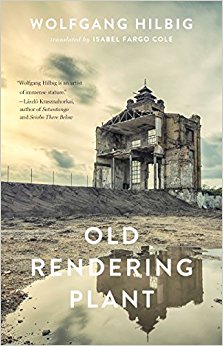We like to say that the making of poetry and lyric prose is not dependent on a prior narrative and that no particular kind of experience is required for creativity. We see what occurs and then create new forms in order to newly present the world to ourselves. Nevertheless, prior narratives won’t die without a fight. Wolfgang Hilbig (1941-2007) was especially resentful of and resistant to imposed language, as well as compulsively capable of generating his own forms. His long preoccupation with self-invention through narrative culminates in Old Rendering Plant, originally published as a novella in Germany in 1991. The novel comprises a world utterly given to itself, an outburst of urgent invention that mocks its extra-literary backstories – even while the writing trembles with the aftershocks of a history.
 Recalling his youth in a landscape that evokes the “barren resignation” of the GDR, the unnamed narrator of Old Rendering Plant begins by describing his solitary wanderings, first following a brook, then picking his way along railroad tracks to the sinister remnants of a coal-fired factory. His family had forbidden him to venture to the bombed ruins near his town, and when he repeatedly returned home late for supper, he was punished. He says, “It was a kind of self-oblivion that made it easy to say whatever came to mind when asked where I’d been.” This puts the reader in the position of a tolerant and understanding elder, the wished-for intimate. The self-oblivion is the outset of self-invention. He continues:
Recalling his youth in a landscape that evokes the “barren resignation” of the GDR, the unnamed narrator of Old Rendering Plant begins by describing his solitary wanderings, first following a brook, then picking his way along railroad tracks to the sinister remnants of a coal-fired factory. His family had forbidden him to venture to the bombed ruins near his town, and when he repeatedly returned home late for supper, he was punished. He says, “It was a kind of self-oblivion that made it easy to say whatever came to mind when asked where I’d been.” This puts the reader in the position of a tolerant and understanding elder, the wished-for intimate. The self-oblivion is the outset of self-invention. He continues:
I couldn’t bear to miss the hour when unknown life, rumored to be dead, crept out under the shelter of the shadows, crept out in the hour of the shadows that wandered across the world to obscure it from the eye, in the hour of the obscuring shadows that hid in the grave of night, in the hour when the vanished began their day, in the hour when I became invisible, guided only by scents whose signals no longer brushed my brain, but coursed from my senses straight to my limbs …
The language with which he shapes his narrative is offered as an alternative to the words used by parents and government:
Wasn’t the use of substantive nouns nearly always a silence about the true substances of things – and wasn’t that silence so essential to us that it became the basic material of our thinking? What were we really passing over: over silenced things, over vanished things, over the basic substance of ourselves, over the silence in our thoughts?
The stultifying limits enforced by family, class, politics, history and daily events are the classic materials of a bildungsroman, and Old Rendering Plant can be read, and perhaps initially must be read, as recognizable — a tale of growing-up among intimidations, baleful precedent, and heartlessness. Most of the interaction occurs between narrator and his environment, with passing mention of the war’s air raids, rumors of sudden disappearances, missing people, and the stench – the latter caused by “a brew of rancid fatback,” the accumulated drippings and disposed carcasses from “Germania II,” the plant where animal were slaughtered, their fats rendered as ingredients for the manufacture cleaning agents. When he hears the sound of a train, it signifies “perpetual evacuation of vanished existence.”
 Hilbig grew up in Meuselwitz, 60 kilometers north of the Czech border. Subcamps of the Buchenwald concentration camp were located there as well as wartime factories run by slave labor. As a young man, he served in the military, then worked in several small factories: he knew the “wretched labor that contributed to the self-contempt of our class.” In the late 1970’s, Hilbig was interrogated by the Stasi for poems published in the West. Disaffection with the socialist agenda merged with estrangement from his family. In Old Rendering Plant, the narrator says, “What I had long since become, I thus became more deeply: just as much of an outsider in this town, in the eyes of the ordinary folks that is, who perhaps already counted me, with an unerring instinct, among those who had eluded me. I resembled them deceptively in the way I went around — breathing like someone unable to find a functional airhole …”
Hilbig grew up in Meuselwitz, 60 kilometers north of the Czech border. Subcamps of the Buchenwald concentration camp were located there as well as wartime factories run by slave labor. As a young man, he served in the military, then worked in several small factories: he knew the “wretched labor that contributed to the self-contempt of our class.” In the late 1970’s, Hilbig was interrogated by the Stasi for poems published in the West. Disaffection with the socialist agenda merged with estrangement from his family. In Old Rendering Plant, the narrator says, “What I had long since become, I thus became more deeply: just as much of an outsider in this town, in the eyes of the ordinary folks that is, who perhaps already counted me, with an unerring instinct, among those who had eluded me. I resembled them deceptively in the way I went around — breathing like someone unable to find a functional airhole …”
Finally, the novel names names, spelling out the tragic history of eastern Europe:
… if you were hired at Germania II your past was dead and buried … once they faced each other hostile and hate-filled – German, Poles, Russians, stateless people, renegades … communists and Nazis … the missing men and their pursuers – but here a different darkness cooped them together …
Old Rendering Plant was described by one critic as an “allegorical novel about East Germany and the Stasi.” It is not an allegory. And it does not speak to the reader from a lofty plane, looking down in judgment. It speaks upward from the weeds beside the brook. It judges humans very severely, peering beyond the facts of history and down into the psyche – and that is its main pleasure. Isabel Fargo Cole acutely hears Hilbig’s unforgiving tone but also captures his plosive expressiveness, resulting in not only a vast indictment, but the emergence of an irrepressible individual presence. The country’s destruction and the repressive measures of its so-called recovery have provided an opportunity. Hilbig, after all, was a modernist – he loved Poe and Baudelaire as a young reader. It was Baudelaire who wrote, De la vaporization et de la centralasion du Moi. Tout est lá — “The dispersion and reconstitution of the self. That’s the whole story.” Ultimately, it’s Hilbig’s story, too.
[Published by Two Lines Press on November 7, 2017. 120 pages, $12.95 paperback]